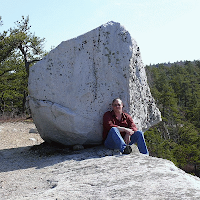So I was in my office yesterday morning (Friday, April 5), engrossed in proofreading an important document going out to our college's accrediting agency, when I vaguely felt something. My colleague, in the adjacent office said "Was that an earthquake?" and I first thought maybe it was someone working on the roof (which they've been doing a lot lately) or it was a strong wind gust (but looking out the window showed everything calm). I pulled up the National Earthquake Information Center and, low and behold, a magnitude 4.8 earthquake in northwestern NJ popped up. So I guess I did feel it, but didn't recognize it as an earthquake at the moment. Same is true for a lot of other people I talked to at the college.
As a geologist, a moderate earthquake in New Jersey doesn't overly surprise me. While not common, they do occur. A few aftershocks have also occurred, the strongest a 4.0.
This difference is due to the fact that rocks in the east are older, colder, and more intact than rocks in the west. Out west, the rocks are much more fragmented by faults and these faults attenuate (weaken) the energy from earthquakes. Here's a map of felt shaking from the New Jersey quake.
So how often do earthquakes occur in New Jersey? Here's a nice map.
I will continue this discussion in a second post in a day or two...








No comments:
Post a Comment